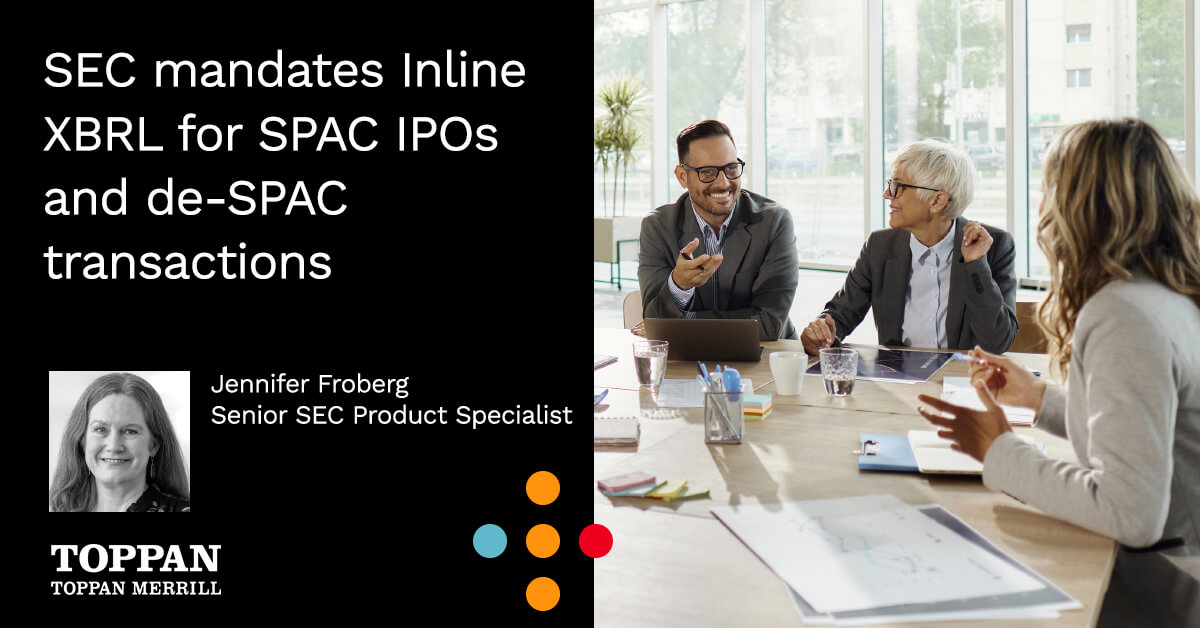SEC has been doling out investor bulletins, disclosure guidance, alerts, and staff statements relating to Special Purpose Acquisition Vehicles (SPAC) for a while now. On March 31, 2021, SEC released not one but two separate statements on select issues pertaining to SPACs, one from the Division of Corporation Finance and another from the Office of the Chief Accountant.
The first announcement focused on highlighting certain limitations associated with completing a business combination with a SPAC and emphasizing the immediate set of compliance and disclosure requirements that come with being a public company, as a result of SEC regulations and securities exchange rules, like those of NASDAQ or NYSE. The tone of the announcement almost seemed to draw attention to, if not warn, private companies who may be too hasty to jump on the SPAC bandwagon without considering the various resources and extensive planning it takes to stay compliant and avoid scrutiny from regulators. Specifically, it highlights the following:
- SPACs are subject to certain restrictions including a requirement for the acquired business to file financial statements in its 8-K four business days after the completed business combination, as the SPAC is a shell company the 71-day extension is not available; the combined company will be ineligible to incorporate Exchange Act reports and proxy statements by reference on Forms S-1 for three years;
- The resulting combined company will be ineligible to use Form S-8 to register compensatory securities for 60 days after having filed a Form 10 reflecting its status as an entity that is not a shell company; and the combined entity will be an “ineligible issuer” under Securities Act Rule 405 for three years, which among other things may make it ineligible to use a free writing prospectus;
- The accounting, financial reporting, and governance responsibilities that come with being an Exchange Act reporting company, like maintaining books and records in reasonable detail, having robust internal accounting and disclosure control procedures, and management’s oversight on evaluating the effectiveness of both;
- Combined companies should satisfy qualitative and quantitative standards of a national securities exchange (assuming that is where the SPAC is listed) in order to maintain its listing and avoid the risks associated with failing to adhere to these standards. Examples of quantitative standards include the number of round lot holders, publicly held shares, market value of publicly held shares, and share price. Qualitative standards are more geared towards corporate governance requirements such as having a majority independent board of directors, an independent audit committee consisting of directors with specialized experience, independent director oversight of executive compensation and the director nomination process, and a code of conduct applicable to all directors, officers, and employees.
Similarly, the second statement from the Office of the Chief Accountant dives deeper into the complex financial reporting and governance issues arising from a SPAC-private company business combination and lays out for a private company different market and regulatory considerations. It emphasizes that a company planning for a traditional IPO may take years to transition into becoming a public company that may allow it to be better-prepared post-IPO, but once a SPAC has identified a target company, the business combination may be complete in a matter of a few months. It signals that a private company planning to engage in a de-SPAC transaction should evaluate, engage in thorough advance planning, round up necessary resources or be ready to do so, and prepare to face of obligations of being a public company.
The SEC’s interest in scrutinizing SPAC is not surprising, after all, in just the first two months of 2021, the number of new SPACs and amount of capital raised by those SPACs has been reported to already equal nearly three-fourths of all SPAC activity last year
View Source (for all formatting, tables, footnotes, etc.)
Toppan Merrill is here to help
The experts at Toppan Merrill have supported hundreds of SPAC IPOs and De-SPAC Transactions and understand the enormous complexity of the initial transactions as well as the importance of preparing for the rigors of post-IPO compliance. Connect with one of our experts at [email protected] or by calling 800.688.4400



